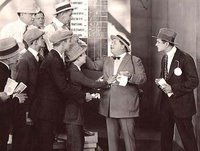 president bush signed legislation to criminalize internet gambling on friday. under the unlawful internet gambling enforcement act, it is illegal to use credit cards, checks and other bank instruments for online bets. i've never gambled online, unless you count my emotional and ill-fated email dinner bets with friends (points? i don't need yer stinking points -- my vikings will win straight up, and you'll be buyin', my friend). whenever new rules are made, however, i like to suss out the winners and losers.
president bush signed legislation to criminalize internet gambling on friday. under the unlawful internet gambling enforcement act, it is illegal to use credit cards, checks and other bank instruments for online bets. i've never gambled online, unless you count my emotional and ill-fated email dinner bets with friends (points? i don't need yer stinking points -- my vikings will win straight up, and you'll be buyin', my friend). whenever new rules are made, however, i like to suss out the winners and losers.senate majority leader dr. bill frist evidently took the lead in attaching gambling restrictions to a port security bill that was virtually assured of passage. the national football league lobbied hard for this one, employing two lobbyists who were former senior aides to senator frist.
the nfl gains much by upholding the perceived integrity of their games, while some senators benefit by distancing themselves from jack abramoff (who had successfully lobbied on behalf of internet gambling) and shoring up the christian conservative base before the election. the big losers, of course, are individual american gamblers and offshore internet gambling operators. those who view gambling as evil or addictive would argue that such costs are offset by the reduced social and individual harm associated with the practice. but will internet gamblers really stop betting?
if these folks continue to bet their $6-12 billion per year, i can think of another beneficiary of criminalization. most serious gamblers probably know a small businessperson who loves the new unlawful internet gambling enforcement act: the local bookmaker. bookies don't usually hire lobbyists like the nfl, but you can bet they are just as pleased with the result. with decreased competition online, demand for their services should increase significantly. now, if the local numbers bankers could just get rid of those pesky state lotteries...

1 comment:
The politicians need to come to the realization that gambling can no longer be monopolized by governments and special interest groups. People should have the right to gamble in the comfort of their own homes over the Internet or in a land-based casino.
Post a Comment